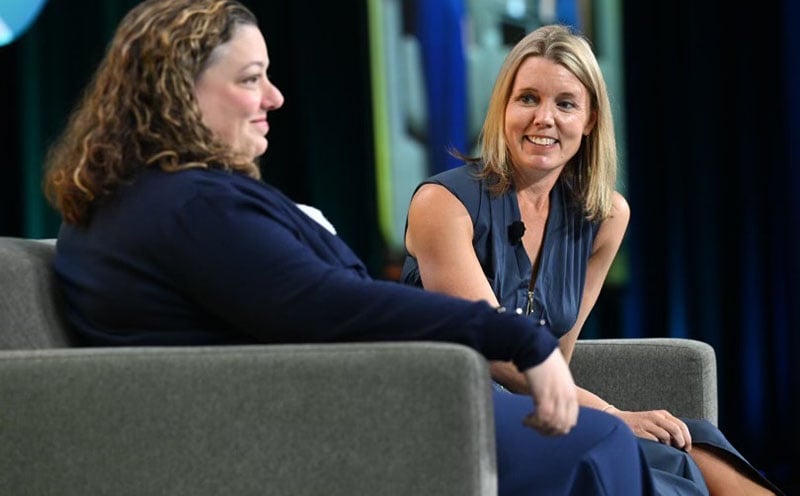If you simply work hard enough and put your nose to the grindstone, everything will work out just fine.
That what we were told, especially people who go into difficult fields like medicine, said journalist and cultural critic Anne Helen Petersen at Tuesday’s ACEP24 Closing General Session.
“Trouble is, as we’ve grown into our 30s and 40s, we’ve been working hard, and we realize everything hasn’t worked out,” she said. “Combine that with the fact that millennials hit that point at the same time as the pandemic hit, we’re seeing what people are calling the great reshuffling, prioritizing quality of life.”
Ms. Petersen shared the stage with ACEP President Alison J. Haddock, MD, FACEP as the two discussed what this means for emergency medicine and what emergency physicians can do to improve some of the challenges facing the specialty. “Shaping the Future of Emergency Medicine: Perspectives on the Modern Workplace” highlighted the burnout rates in emergency medicine - alarming trends boosted by unpredictable schedules and lack of physician autonomy.
They discussed the lack of trust and support from people who are supposed to be supporting them most. Also highlighted was the fact that emergency physicians are essential workers, and sometimes essential workers feel an extra burden because they provide care for those in their worst moments. Dr. Haddock pointed out that emergency medicine unfortunately finishes ahead of most other specialties in surveys about these issues.
“Emergency medicine is a burnout factory, that’s just the truth,” Ms. Petersen said. “Others that might rival it are war correspondent or adjunct faculty. The contract you entered went something like … go into debt, work hard, pay off that debt. That contract is broken. How do we rethink how this all works? How do we rethink compensation?”
After setting the stage with some of the challenges emergency physicians and the specialty face, Dr. Haddock looked to her left from the couch on stage and asked, “So what do we do about it?” By the time the 40-minute discussion was over, Ms. Petersen offered some possible solutions.
- Make time for yourself and explore ways to stay rested and rejuvenated. Technology industry companies, Ms. Petersen said, are encouraging rejuvenation through sabbaticals and those programs are making companies who offer them more attractive.
- Develop robust mentorship opportunities.
- Advocate for improved legal protections and training to address workplace violence in emergency departments.
- Encourage collective action and open communication among emergency medicine professionals to build trust.
- Incorporate the perspectives and priorities of younger generations.
Dr. Haddock and Ms. Petersen spent a few minutes on the importance of a social network. Whether it’s spending more meaningful time with family, with colleagues in the ED or joining one of ACEP’s Sections where you’ll find like-minded physicians, both speakers agreed this can be one of the biggest deterrents to burnout and lack of job satisfaction. Dr. Haddock recalled a time when she was involved in a lawsuit and couldn’t talk with anybody about it – particularly those fellow emergency physicians who understood the situation because they could have been called to testify.
At the time, she also was single. Dr. Haddock said her stress level then was as high as it had been in her life. Ms. Petersen told the crowd of attendees that going to events like ACEP24 can be an excellent remedy. She also said violence in the ED is trauma that needs to be dealt with like trauma would be dealt with outside the hospital.
“ED violence is trauma, and if you experience trauma, understand that this is important, especially if you experience it for the first time,” Ms. Petersen said. “Have some counseling, talk to people who have been through it, and take it very seriously. Just working through it isn’t the way to get over it.”
Dr. Haddock and Ms. Petersen closed the session with more discussion on workplace flexibility, and Dr. Haddock mentioned some of the work ACEP is doing to build inclusivity and workplace support. After taking questions from the audience about quality of care and the impact of social medicine on the future of the specialty, they passed a torch from Las Vegas to Salt Lake City, the site of ACEP25.
Dr. Alison’s daughter, Dahlia, ran up the aisle and literally passed the torch to her mom, who handed it to Utah President Alison L. Smith, MD, MPH, FACEP, who gave attendees a glimpse of what to expect Sept. 7-10, 2025, in Salt Lake City.



